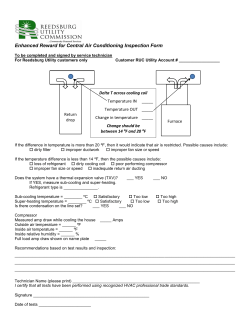
CFC RECYCLING - Environmental Health & Safety
Facilities Operations and Development Environmental Health and Safety CFC RECYCLING Introduction 1314 Kinnear Road #106 Columbus, OH 43212-1168 614-292-1284 Phone 614-292-6404 Fax www.ehs.osu.edu Ozone depleting substances used in refrigeration and air conditioning appliances include chlorofluorocarbons and hydrochlorofluorocarbons, collectively referred to in this Factsheet as CFCs. This group of chemicals has been demonstrated to be harmful to the stratospheric ozone layer and is subject to a production phaseout. As a result of the Clean Air Act requirements, the EPA has established a national recycling program for these substances when recovered during the servicing and disposal of refrigeration and air conditioning equipment. This guideline outlines key requirements for recycling and recovery activities for appliances containing CFCs for both large and small appliances and motor vehicle air conditioning equipment. "Small" appliances include appliances containing less than 5 pounds of refrigerant such as room size window air conditioners, residential-sized refrigerators, water bubblers, etc. Appliances Applicable Regulation - Protection of Stratospheric Ozone; Refrigerant Recycling; Final Rule 40 CFR Part 82, US EPA. Summary of Requirements Prohibited Practices No person maintaining, servicing, repairing or disposing of appliances may knowingly vent or otherwise release into the environment any CFC used as refrigerant. There are significant fines and penalties for violation of this regulation. Appliances may not be opened for maintenance, service or repair, and no person may dispose of appliances unless: a) EPA-required recycling and recovery practices are followed; or b) certified recycling and recovery equipment is used. No person may recover refrigerant from small appliances for the purposes of disposal of these appliances unless that person has certified to the EPA that he has acquired recovery equipment that meets EPA standards and that all applicable requirements are being met by that person. Effective November 14, 1994, no person may open an appliance and no person may dispose of an appliance unless that person has received the appropriate EPA technician certification. Exception: Technician certification is not required for the disposal of small appliances. Effective November 14, 1994, CFC refrigerants may not be sold to a person unless that person has the appropriate technician certification. Required Practices All persons opening appliances must evacuate the refrigerant to either a system receiver or a certified recycling or recovery machine. Specific evacuation requirements are included in EPA regulations. Persons who do their own recycling and recovery of refrigerants must send the EPA a certification form by August 12, 1993. Refrigerant evacuation levels depend on the appliance size, usage category and refrigerant type. Training Technician certification is required for personnel involved in the procurement, use or disposal of CFCs or CFCcontaining equipment. Certification is provided only through EPA-approved technician certification training programs. The required certification category depends on appliance size and refrigerant type. Page 1 of 3 May 2015 Environmental Health & Safety|1314 Kinnear Road |Phone: 292-1284| www.ehs.osu.edu Facilities Operations and Development Environmental Health and Safety CFC RECYCLING 1314 Kinnear Road #106 Columbus, OH 43212-1168 614-292-1284 Phone 614-292-6404 Fax www.ehs.osu.edu The use or operation of CFC recycling equipment is subject to registration of equipment with the EPA. Release of Reporting greater than 100 pounds of CFC 12 and CFC 113 within a 24 hour period must be reported to US EPA, and National Response Center. Note: Unintentional release of Halon 1211 and Halon 1301 are not reportable. Refrigerant R-500 contains a reportable substance. Releases of greater than 100 pounds of R-500 are reportable. Recordkeeping Persons servicing, owning or operating appliances normally containing more than 50 pounds of refrigerant must maintain records documenting the date and type of service and the quantity of refrigerant added. All records must be kept at least three years. Persons disposing of small appliances must maintain copies of signed statements from the appliance supplier (e.g. the original owner or disposal contractor) if the supplier indicates that he has removed the refrigerant from the appliance. Motor Vehicle Air Conditioning Equipment Applicable Regulation Protection of Stratospheric Ozone; Refrigerant Recycling:"Final Rule," 40 CFR Part 82, Subpart B, US EPA Summary of Requirements Prohibited Practices No person repairing or servicing motor vehicles for consideration (pay) may perform any service on a motor vehicle air conditioner involving the refrigerant for such air conditioner without properly using approved equipment and unless such person has been properly trained and certified through an approved program. The intentional venting or disposal of refrigerant is prohibited CFC refrigerants may not be sold to a person unless that person has the appropriate technician certification. Required Practices Technicians who service motor vehicle air conditioners must use recovery / recycling equipment that has been certified by an EPA-approved organization. A statement must be submitted to EPA certifying the purchase and use of approved equipment Recovered refrigerant must be sent only to an EPA-approved reclaimer. Training All persons that repair or service motor vehicle air conditioning equipment for consideration must be properly trained and EPA section 609 certified. Each technician must have his/her own certification through an approved program. Recordkeeping A copy of the certification for each technician must be kept on file at the shop. Records must be kept of the name and address of any facility to which refrigerant is sent. Required records must be maintained on site for at least three years. Page 2 of 3 May 2015 Environmental Health & Safety|1314 Kinnear Road |Phone: 292-1284| www.ehs.osu.edu Facilities Operations and Development Environmental Health and Safety CFC RECYCLING University Resources The Ohio State University EHS 292-1284 Physical Facilities Maintenance 292-3309 Ozone protection helpline toll free (800) 296-1996 Page 3 of 3 1314 Kinnear Road #106 Columbus, OH 43212-1168 614-292-1284 Phone 614-292-6404 Fax www.ehs.osu.edu May 2015 Environmental Health & Safety|1314 Kinnear Road |Phone: 292-1284| www.ehs.osu.edu
© Copyright 2025









